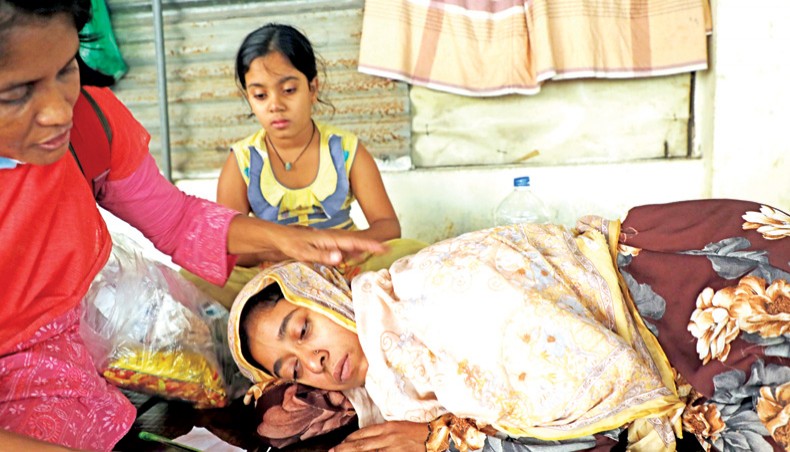
This file photo taken on November 12 shows a woman consoling the wife of RMG worker Jalal Uddin, who died earlier on the day after suffering rubber bullet injuries during a clash with police in Gazipur, while his daughter looks on at Dhaka Medical College Hospital. — Sony Ramany
The deaths of ready-made garment workers during different labour movements, mostly for wage hikes, have remained uninvestigated for years.
Labour rights activists said that due to no justice for the killing of workers such incidents were on the rise, resulting in deaths of more workers.
At least 10 garment workers have been killed in labour unrest in the past 10 years, including five this year.
No case was filed in most of the incidents, while police filed Unnatural Death cases in some incidents.
Families of the victims alleged that police and factory management dissuaded them from filing cases.
‘If family and friends of the victims do not file a case, the police must do it,’ said Supreme Court lawyer Jyotirmoy Barua.
‘No killing of a citizen could remain unaddressed,’ he said.
In November 2013, GMS Composite Knitting workers Badshah Miah and Ruma Akter died during a demonstration in Gazipur.
In December 2018, Bubli Begum, a worker at a factory in the Gazipur BSCIC industrial area, was killed during a wage protest.
In January 2019, Sumon Kha, a worker at the Anlima Group factory in Savar, died in an alleged police firing during labour unrest.
Sumon succumbed to his injury at Savar Upazila Health Complex days after he was hit by a bullet in his chest.
Sumon’s brother Swapon Kha said that police or no other government agencies approached them to investigate his death.
Swapon said they did not feel encouraged to file a case since police were involved in the killing of his brother.
Savar police station officer-in-charge Dipak Kumar Saha confirmed that no case was filed over the incident in the past four years.
In June 2021, DEPZ garment factory Gold Tex Garment’s Jesmin Akter was killed during a clash between police and workers.
Bangladesh Garment and Industrial Workers Federation Gazipur unit president Shahidul Islam was beaten to death by a rival group shortly after he came to a sweater factory to talk with authorities over the unpaid wages of workers on June 25.
Kalpona Akter, executive director of the Bangladesh Centre for Workers Solidarity, lodged a case over the killing.
Police arrested 11 people in the case, while four secured bail, said plaintiff Kalpona.
The investigation into the killing is yet to be completed, she said.
During the recent labour unrest, at least three workers were killed in an alleged police shooting, while one worker was burned to death in his factory that came under an arson attack.
Only two UD cases were filed with Konabari police station, while there was no official record of two other killings.
One of the UD cases was filed over the death of Anjuara Khatun, 32, a sewing machine operator of Islam Garments Ltd in Konabari, who died at Dhaka Medical College Hospital on November 8 after sustaining a bullet injury to her head.
Jamal Hossain Badsha, the husband of Anjuara, said that he could trust the police to get justice and thus did not file any case.
Another UD case was filed over the killing of Jalal Uddin, 40, of the same factory in the same incident.
His wife, Nargis Parvin, said that her husband was killed in gunfire as she saw several bullet marks on the left side of his belly.
Sub-inspector and investigative officer of both cases, Jamiul Hasan Sumon, said that he was waiting for the post-mortem reports before launching his investigation.
No case has been filed over the death of Russell Hawlader, 25, a worker at Design Express Ltd in Gazipur, who succumbed to his bullet injury at DMCH on October 30.
Russell’s father, Hannan Hawlader, said that he was not willing to file any case to avoid further harassment.
Hannan, a resident of Binoykathi in Jhalakathi, said local police visited his house several times.
‘I am a poor man. I cannot go to Dhaka too often to run a case,’ he said.
However, Bason police station officer-in-charge Abu Siddique said that if anyone filed a case over the killing of workers, they would receive it.
No case was filed over the recovery of the body of Eman Ali, a worker at ABM Fashion Ltd.
Rights activists said that the police did not file a case to wipe out the killing of workers from public memory.
‘Filing of no case in the killing of workers testaments to how these workers are exploited in their workplace,’ said Bangladesh Garment Workers’ Solidarity president Taslima Akhter.
She alleged that police illegally oppressed them to stop their voices and demanded justice for the killing of the workers.
A total of 53 cases have been filed during the recent unrest, leading to the arrest of around 100 people, mostly workers, said Zakir Hossain Khan, deputy inspector general of the Industrial Police.
‘Police file cases and receive cases against workers eagerly, but they are unwilling to ensure justice for workers,’ observed Ain o Salish Kendra executive director Faruq Faisel.
He said that opening fire on protesting workers was a crime, and denying justice to them was another crime.
New Age









